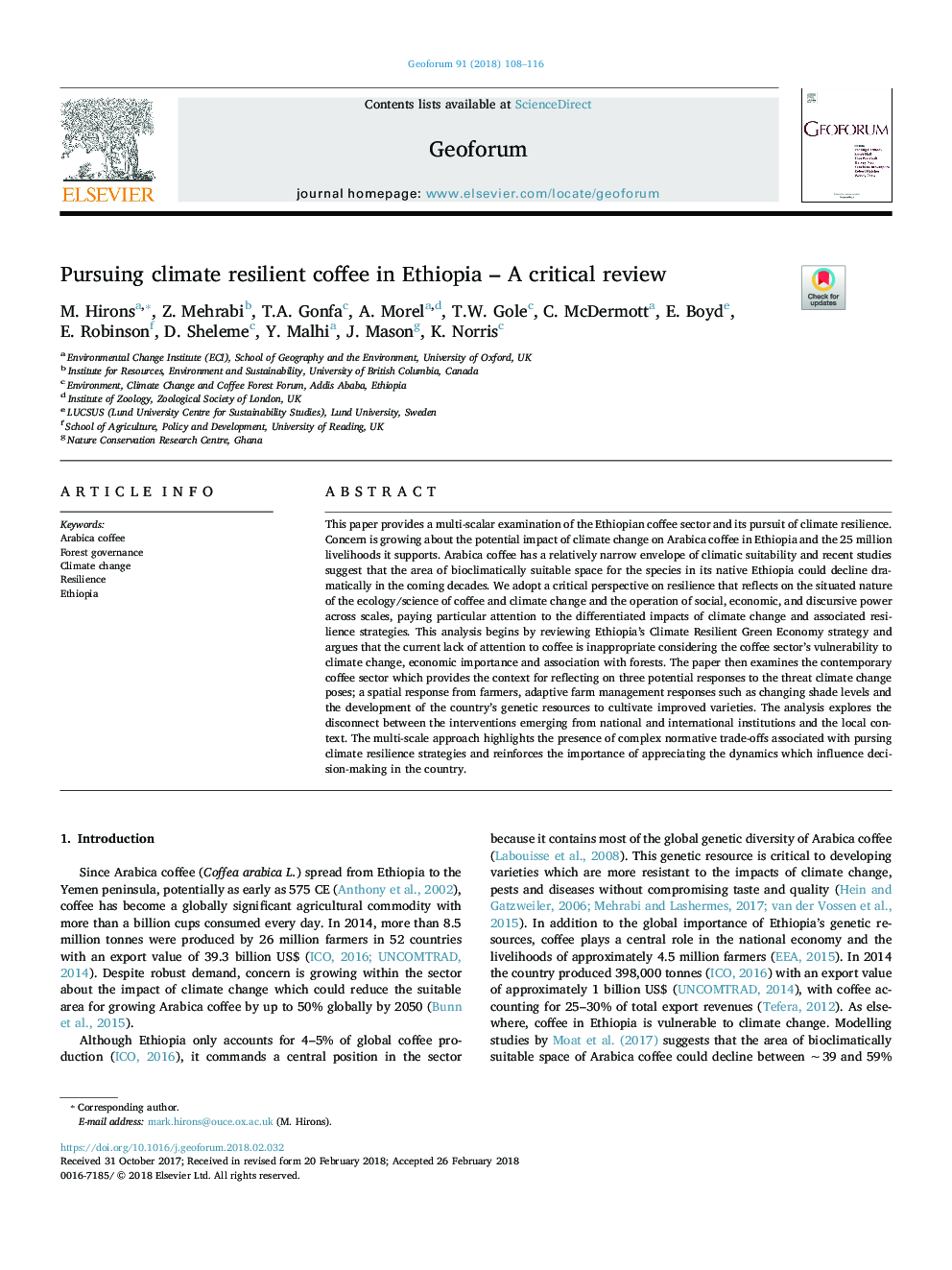| کد مقاله | کد نشریه | سال انتشار | مقاله انگلیسی | نسخه تمام متن |
|---|---|---|---|---|
| 7353545 | 1477098 | 2018 | 9 صفحه PDF | دانلود رایگان |
عنوان انگلیسی مقاله ISI
Pursuing climate resilient coffee in Ethiopia - A critical review
ترجمه فارسی عنوان
قهوه انعطاف پذیر در اتیوپی - بررسی انتقادی
دانلود مقاله + سفارش ترجمه
دانلود مقاله ISI انگلیسی
رایگان برای ایرانیان
کلمات کلیدی
قهوه عربیکا، حکومت جنگل، تغییر آب و هوا، انعطاف پذیری، اتیوپی،
ترجمه چکیده
این مقاله یک معاینه چندگانه از بخش قهوه اتیوپی و دنبال کردن قابلیت انعطاف پذیری آن را فراهم می کند. نگرانی در مورد تاثیر بالقوه تغییرات آب و هوایی در قهوه عربیکا در اتیوپی و 25 میلیون معیشت از آن حمایت می کند. قهوه عربیکا دارای پوشش نسبتا کمی مناسب بودن شرایط آب و هوایی است و مطالعات اخیر نشان می دهد که منطقه مناسب فضای بیولوژیکی برای گونه های آن در اتیوپی بومی می تواند به طور چشمگیری در دهه های آینده کاهش چشمگیری داشته باشد. ما یک دیدگاه انتقادی بر انعطاف پذیری می گیریم که بر طبیعت بوم شناختی / علم قهوه و تغییرات اقلیمی و بهره برداری از قدرت اجتماعی، اقتصادی و گفتمانی در سراسر مقیاس، توجه ویژه ای به تاثیرات متفاوتی از تغییرات اقلیمی و انعطاف پذیری استراتژی ها. این تجزیه و تحلیل با بررسی استراتژی اقتصاد مقاومتی بر پایداری اقلیمی اتیوپی آغاز می شود و استدلال می کند که عدم توجه به قهوه در حال حاضر با توجه به آسیب پذیری بخش قهوه به تغییرات آب و هوایی، اهمیت اقتصادی و ارتباط با جنگل ها نامناسب است. این مقاله سپس بخش قهوه معاصر را بررسی می کند که زمینه را برای بازتاب در مورد سه پاسخ بالقوه به تهدید تغییر آب و هوا ارائه می دهد؛ پاسخ فضایی از کشاورزان، پاسخ سازمانی مدیریت مزرعه سازگار از قبیل تغییر سطح سایه و توسعه منابع ژنتیکی کشور برای پرورش گونه های بهبود یافته است. این تجزیه و تحلیل به بررسی اختلاف بین مداخلات ناشی از نهادهای ملی و بین المللی و زمینه های محلی می پردازد. رویکرد چند مرحله ای، حضور مجتمع های هنجاری پیچیده مرتبط با استراتژی های انعطاف پذیری اقلیمی را برجسته می کند و اهمیت ارزیابی پویایی را که بر تصمیم گیری در کشور تأثیر می گذارد، تقویت می کند.
موضوعات مرتبط
علوم انسانی و اجتماعی
اقتصاد، اقتصادسنجی و امور مالی
اقتصاد و اقتصادسنجی
چکیده انگلیسی
This paper provides a multi-scalar examination of the Ethiopian coffee sector and its pursuit of climate resilience. Concern is growing about the potential impact of climate change on Arabica coffee in Ethiopia and the 25 million livelihoods it supports. Arabica coffee has a relatively narrow envelope of climatic suitability and recent studies suggest that the area of bioclimatically suitable space for the species in its native Ethiopia could decline dramatically in the coming decades. We adopt a critical perspective on resilience that reflects on the situated nature of the ecology/science of coffee and climate change and the operation of social, economic, and discursive power across scales, paying particular attention to the differentiated impacts of climate change and associated resilience strategies. This analysis begins by reviewing Ethiopia's Climate Resilient Green Economy strategy and argues that the current lack of attention to coffee is inappropriate considering the coffee sector's vulnerability to climate change, economic importance and association with forests. The paper then examines the contemporary coffee sector which provides the context for reflecting on three potential responses to the threat climate change poses; a spatial response from farmers, adaptive farm management responses such as changing shade levels and the development of the country's genetic resources to cultivate improved varieties. The analysis explores the disconnect between the interventions emerging from national and international institutions and the local context. The multi-scale approach highlights the presence of complex normative trade-offs associated with pursing climate resilience strategies and reinforces the importance of appreciating the dynamics which influence decision-making in the country.
ناشر
Database: Elsevier - ScienceDirect (ساینس دایرکت)
Journal: Geoforum - Volume 91, May 2018, Pages 108-116
Journal: Geoforum - Volume 91, May 2018, Pages 108-116
نویسندگان
M. Hirons, Z. Mehrabi, T.A. Gonfa, A. Morel, T.W. Gole, C. McDermott, E. Boyd, E. Robinson, D. Sheleme, Y. Malhi, J. Mason, K. Norris,
